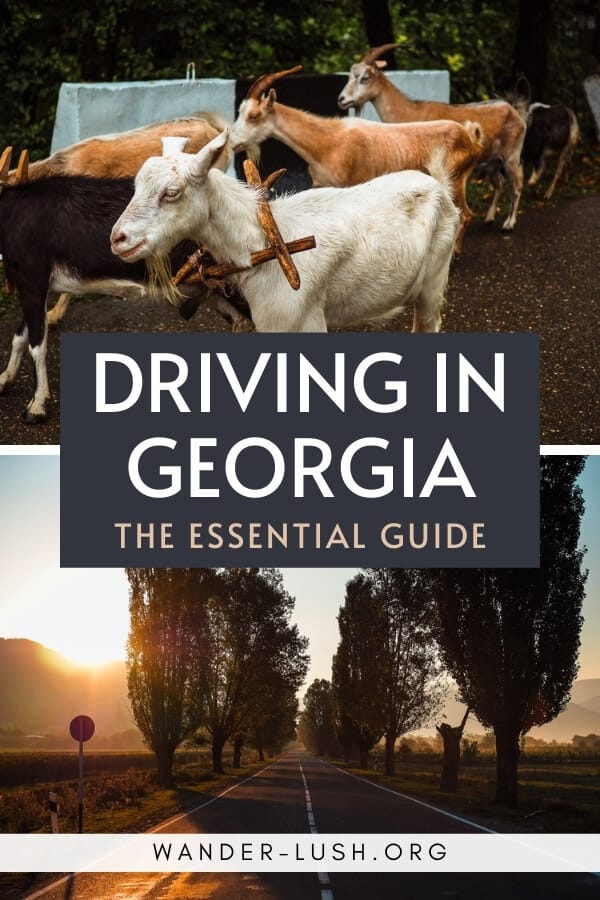[2024] Guide to Renting a Car in Tbilisi & Driving in Georgia
27 min readYour one-stop guide to driving in Georgia in 2024 – including up-to-date information about road conditions, essential safety tips, and the ins and out of renting a car in Tbilisi.
When I first travelled to the Caucasus, I would never have dreamed of putting the words ‘Georgia’ and ‘road trip’ in the same sentence.
I am an experienced driver – and I’m a huge fan of road trips, having driven around Spain, Oman and Montenegro in recent years. But the thought of getting behind the wheel in Georgia always terrified me.
The main reason I was so hesitant about renting a car in Tbilisi is the style of driving I observed during my first few years living and travelling in Georgia. If you have spent any time in the country, then you will know what I mean when I say that things are done slightly differently on the roads here.
It took some convincing, but I finally took the plunge and rented a car during my first summer in Georgia. That road trip still stands out as one of the most rewarding travel experiences I have had here.
Four years and a dozen more driving trips later, I am officially about to rent a car for the last time… Not because I have grown tired of driving in Georgia, but because I love it so much, I have decided to buy my own car!
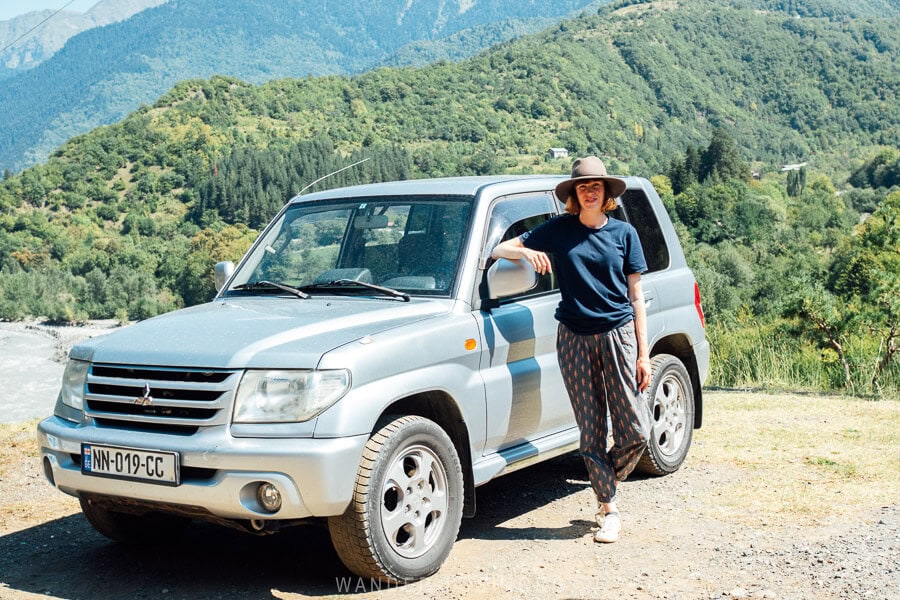
The last four years have taught me that driving in Georgia is nowhere near as bad as it looks.
Given the choice between driving and using marshrutka vans, I would take self-driving every time. You can set your own schedule, move at your own pace, and ultimately control your own fate. And you will see and experience so much more.
There are certain things you need to know before you jump in, however.
In this guide, I will paint you a picture of the road conditions and driving style in Georgia. I will offer my best practical tips for a successful road trip, including important information about staying safe.
I will also give you some itinerary inspiration, point out my favourite drives, and give you a full breakdown about renting a car in Tbilisi or elsewhere through an international company or a local agent.
This is an epic guide packed with helpful tips. Jump ahead using the links below, or else buckle up for a detailed and brutally honest look at driving in Georgia.
Please note: This post contains affiliate links, meaning I may earn a commission if you make a purchase by clicking a link (at no extra cost to you). Learn more.
This post was first created in partnership with Local Rent (formerly MyRentACar), who supplied my rental car for 10 days free of charge in exchange for a fair and honest review. I have since rented from them more than a dozen times. All opinions, recommendations and criticisms are 100% my own.
Should you rent a car in Georgia?
First things first: Do you even need to hire a car in Georgia?
Georgia is a small country, and transportation is fairly easy to navigate (if not a bit slow and clunky).
It is definitely not mandatory to rent a car in Georgia. You can see and do a lot by getting around with marshrutka vans, trains and GoTrip cars.
(The latter is a brilliant private driver service that I use myself all the time for planning day trips and getting from A to B.)
If it’s your first time visiting Georgia, you can quite easily stick to an itinerary like this one that uses public transport.
Looking for an affordable, flexible car rental in Tbilisi?
I use and recommend Local Rent. Save money when you hire directly from a local agent – no credit card or safety deposit required. Pick-up and drop-off from any address in Georgia.
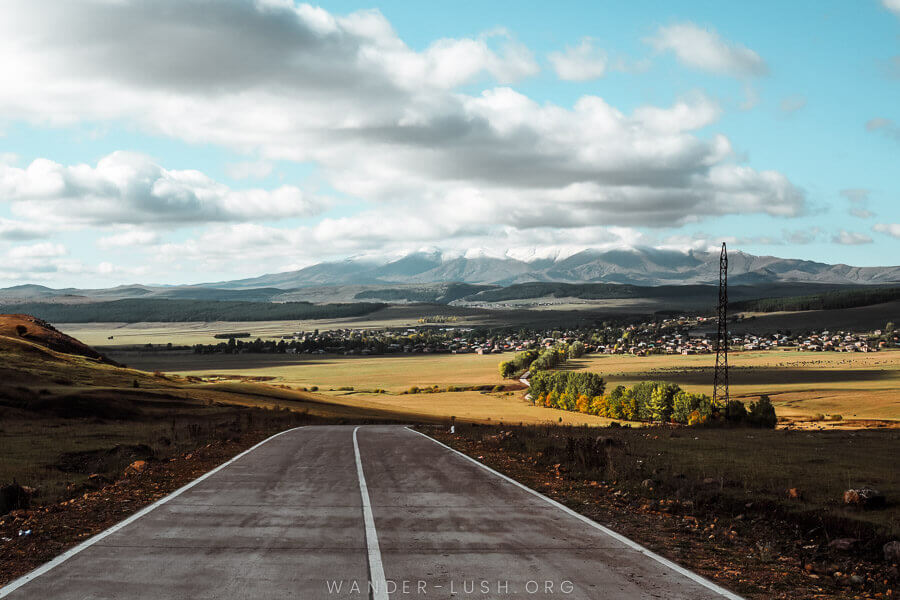
If you’re a repeat visitor or you want to get off the beaten track, there are some major advantages to having your own vehicle:
- You will see a lot more. Needless to say, so much of what makes Georgia Georgia lies off the main highways, away from the big cities. Driving gives you unprecedented access to all the small villages, rural homestays, backstreets, roadside stops and remote areas that will make your trip all the more memorable.
- You can keep to your own schedule. The thing about marshrutka vans is that the schedule isn’t always predictable. Driving your own car isn’t necessarily any faster than taking a van – it may actually take longer if you make lots of stops – but you’ll end up fitting a lot more into each day if you can make early starts and set your own pace.
- You will feel a lot safer. Road safety is a huge issue in Georgia. I’ve had one too many nail-biting marshrutka rides with drivers who have no regard for speed limits. You definitely need to keep your wits about you when driving in Georgia, but in my experience, self-driving gives you a much-needed sense of control over your own fate.
No anxiety over when (or whether!) the marshrutka driver is going to make a bathroom break. No lamenting that you couldn’t pull over for a photo… Hiring a car in Georgia is totally worth it for these two reasons alone.
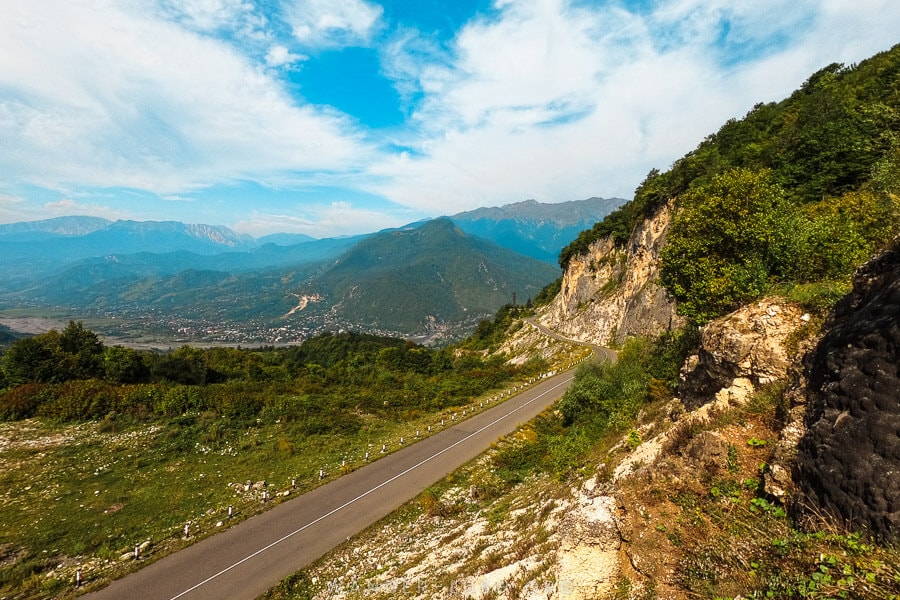
Where can you go on a Georgia road trip?
The possibilities are endless.
Here are just a few of my favourite places to drive in Georgia:
All these locations feature in my Georgia Road Trip Itinerary: Tbilisi to Batumi in 10 Days.
More adventurous travellers will find plenty of opportunities for off-roading in Georgia. If this is you, then I highly recommend picking up a copy of the book Explore Georgia, which contains detailed information and maps for 24 overlanding routes.
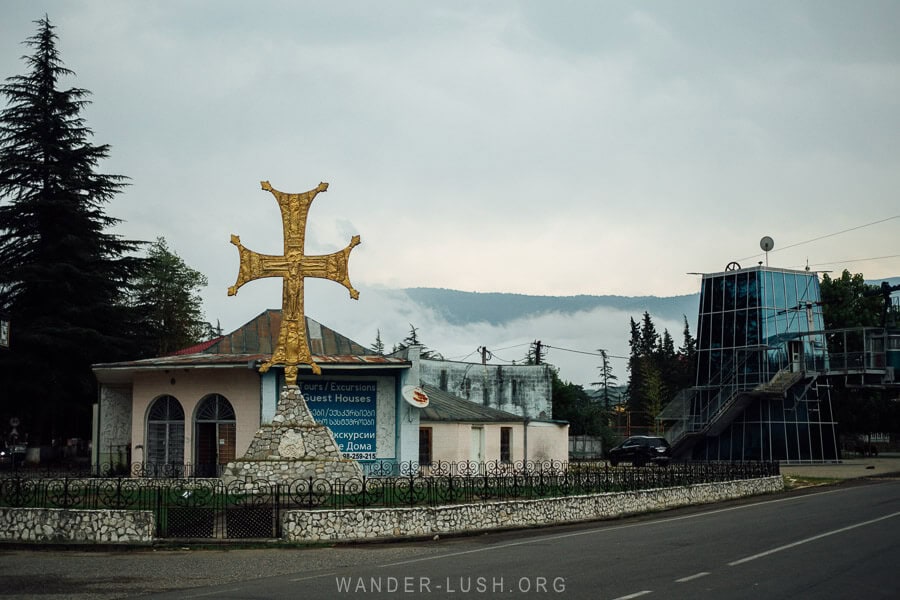
Quick facts about driving in Georgia
Here are the key things you need to know about driving in Georgia. I will go into more depth on these topics in the next section.
- In Georgia, you drive on the right side of the road. Both left and right-hand drive cars are present – for safety, be sure to rent a car that has the steering wheel on the left.
- The speed limit in Georgia is 90 km/hour in non-residential areas or 100-110 km/hour on highways, unless otherwise indicated. In built-up areas, the speed limit is 60 km/hour, but it can be tricky to know where built-up areas start and stop. Look out for the big white signs (example below) that indicate when you have entered a village and therefore need to slow down.
- Seat belts are compulsory in Georgia, but only for the driver and the front seat passenger. Back seat passengers are not required to wear a seatbelt by law – but obviously it’s still wise to buckle up.
- Kids under 7 years old must use a children’s car seat. Most rental companies have these available to hire, but you must request one at the time of booking.
- Traffic lights in Georgia flash amber before they turn red. There is no right turn on red, and wherever you see a green arrow, no left turn on a green light.
- Georgia is party to the Vienna Convention on Road Signs and Signals, meaning traffic lights and signage are much the same as in the rest of Europe. Street signs are normally bilingual or in Latin characters.
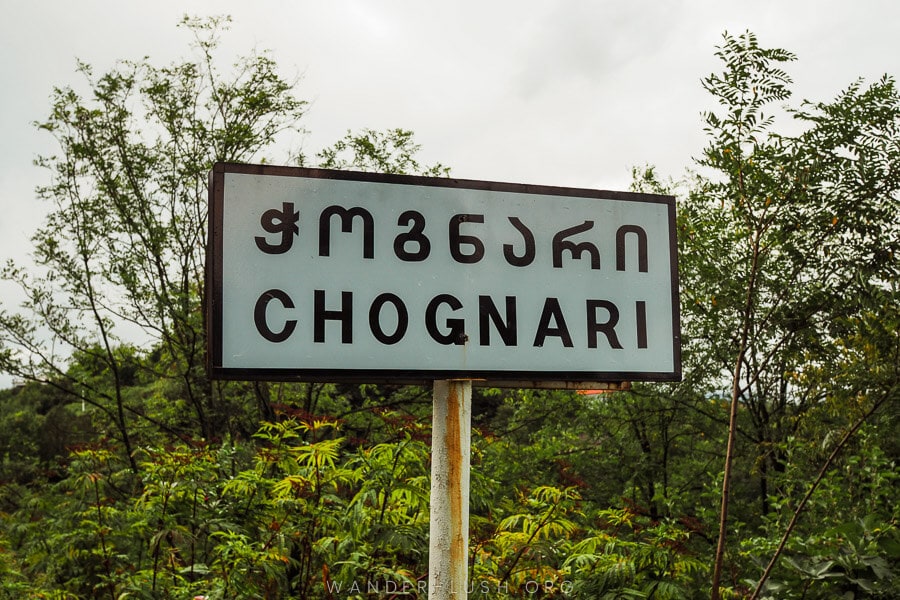
- Georgia has strict rules around drink driving. The legal blood alcohol level is set at 0.03%.
- It is illegal to use a mobile phone when driving in Georgia. If you need to use your phone for navigation, make sure you bring a hands-free dashboard mount with you.
- There is a heavy police presence on the road in Georgia. Speed cameras and red-light cameras are ubiquitous throughout the country. More info on how to check for/pay a fine below.
- Georgia is known for an aggressive driving style and lackadaisical approach to road rules in general. This is definitely something to keep in mind when deciding whether or not you want to drive in Georgia.
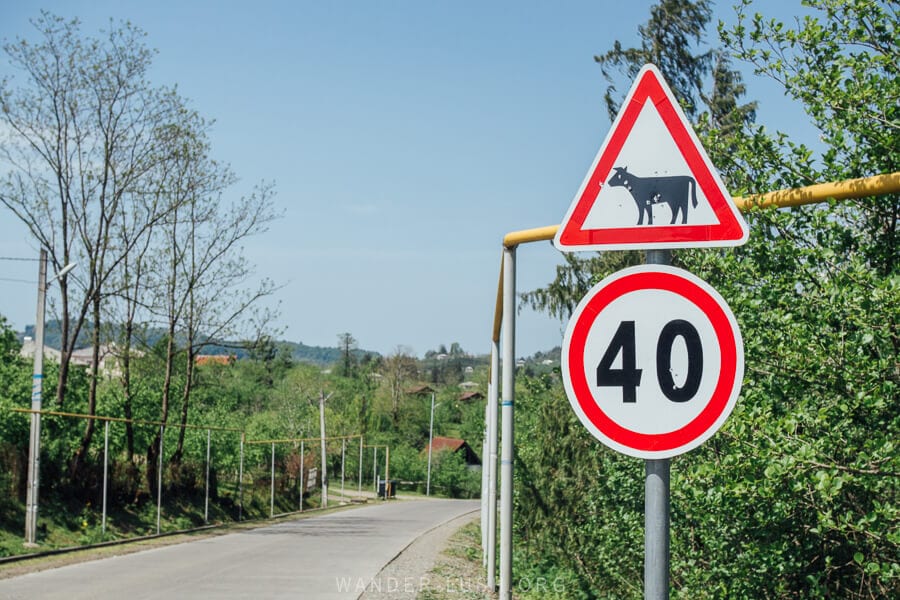
- There are no toll roads or toll tunnels in Georgia.
- All major highways and most smaller roads in Georgia are sealed with a few notable exceptions (more details below). ‘Village roads’ vary from new, sealed roads to very rough backroads. Use the map below to identify any potentially problematic roads before you set off.
- Many high-altitude mountain roads are completely closed off in winter (usually late October to May, depending on the location). Extreme weather events such as flooding and landslides occur semi-regularly in some areas, including in Khevsureti and Racha.
Requirements for driving in Georgia
Most car rental companies have the following requirements:
- You must be aged between 23 years and 75 years
- You must have at least 3 years of driving experience
The lowest age limit I have seen for a rental company here is 21 years (with one year of driving experience).
Most companies will unfortunately not rent to drivers over 75 years for insurance reasons.
Driving in Georgia with a foreign license – do you need an international Driving Permit?
Most car rental companies do not require you to present an International Driving Permit (IDP) when renting a car in Georgia, provided your driver’s license is in Latin characters.
However, if you get into an accident, the police might ask you for an IDP or a notarised copy of your license in Georgian. If you plan to spend a long time on the roads in Georgia, consider getting your license translated and notarised at a notary office. This should cost around 50 GEL.
In addition to your license, you should carry your passport/ID card with you in the car at all times.
All cars in Georgia have their own ‘car passport’, which you should also keep handy. See the FAQ below for more details.
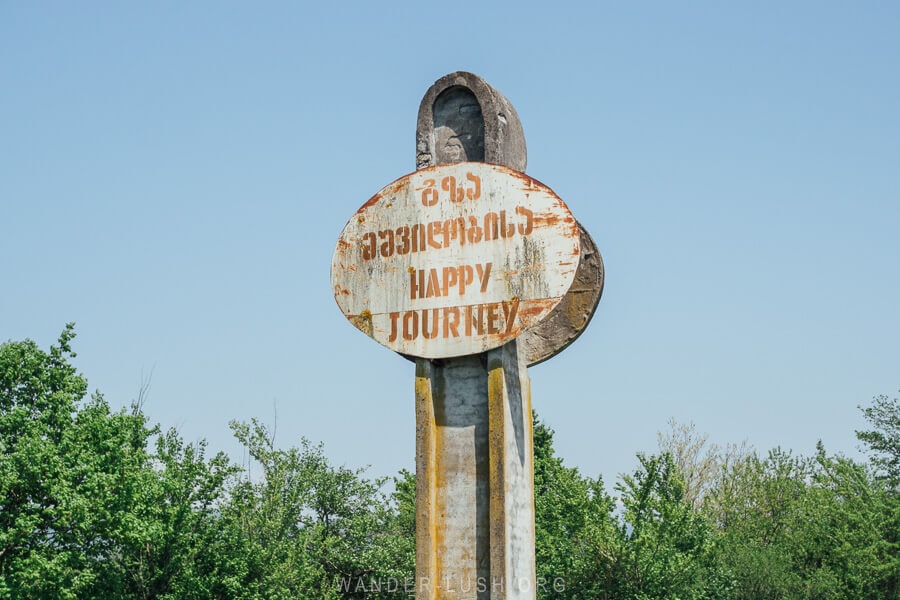
What kind of car do you need for Georgia?
A sedan is all you need for travelling the major roads in Georgia. However, because of potholes, unexpected roadworks and rough roads, hiring a 4WD will give you more freedom and greater peace of mind.
During my first four years in Georgia, I almost always hired a Prius. Every single time I got behind the wheel, I got a flat tire! When it came time for me to buy my own car, I thought it was essential to buy a 4WD.
Whatever you decide, you will want to go with a car that has high undercarriage clearance, is mid-sized at a minimum (for safety reasons), and most importantly has the driver’s seat on the left-hand side.
The majority of rental cars in Georgia are automatic transmission so if (like me) you don’t have a manual license, you don’t need to worry about restricted availability.
A lot of cars in Georgia are missing their catalytic converter, so don’t be surprised if you see this warning light displayed on your dash.
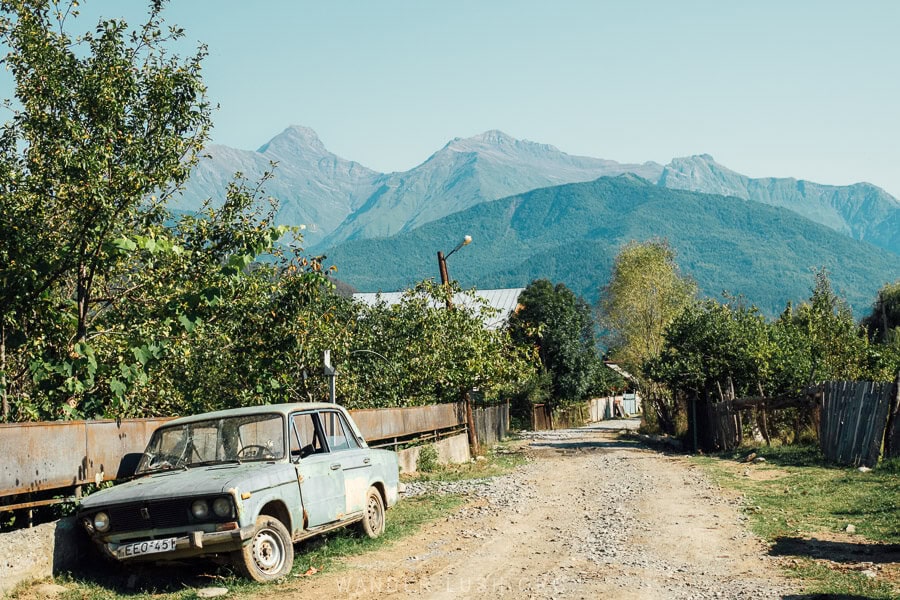
Renting a car in Tbilisi
There are four local options I recommend for renting a car in Tbilisi or elsewhere in Georgia:
- Local Rent is an excellent all-rounder, with a nice supply of both sedans and 4WDs. Prices are lower compared to big-brand companies (more details below). This is the company I always use in Georgia – and for 99% of road trips (including my recommended itinerary), it is perfect.
- Martyna z Gruzji offers off-road and semi-off road vehicles that are suitable for the restricted roads listed below. Use the code wanderlush for 10% off.
- Mta Campervans is based in Kutaisi and rents out campers. Mention me for 10% off.
- Overlando rents our 4×4 camping vehicles and retro-style Buhanka campervans.
While international rental agencies (Hertz, Europcar, etc.) do have a presence in Georgia (including offices at Tbilisi Airport), they are not necessarily the best option.
If you do want to compare prices, I recommend using an aggregator website such as Discover Cars.
Why I use and recommend Local Rent
Local Rent is my preferred platform for hiring a car in Georgia. I have rented from them more than a dozen times in Tbilisi and Kutaisi, and I also used the site for my recent road trip in Albania.
Local Rent is an aggregator, but it differs to other websites in that it offers cars from local agents and smaller rental companies. The range of vehicles is similar (or better) than any other portal – they carry plenty of automatic transmissions, hybrid cars, and 4WDs that are suitable for all roads.
The website lists more than 1,700 cars in Georgia with an average cost of 44 USD per day. You can find deals for as little as 35 USD per day in the off-season.
As well as significantly lower prices, there are several other advantages to using the Local Rent platform:
- No International Driving Permit required to rent
- No cash deposit or credit card required
- Payment is made in cash
- Full refund available if you cancel with 24 hours notice (on some cars)
- Comprehensive insurance included (on some cars)
- Unlimited mileage & no additional driver fees
- Pick-up & drop-off at any address in Georgia
- Reasonable one-way fees
One disadvantage is that cars are usually older models – they might be a little banged up.
Because you are hiring directly from an individual or a small agency, the process is usually less formal – sometimes there is not even a contract. But Local Rent is a trusted middle man, and the platform has its own support for another layer of protection and peace of mind.
Get your car delivered to a convenient location and you can start your road trip without having to drive through Tbilisi city – a huge bonus given that traffic in the capital is atrocious.
Another bonus is that you’ll be supporting a small local business over a big brand.

Process for hiring a car from a local agent
To secure the type of vehicle you want for the best price, I recommend booking your car at least 4-6 weeks in advance. If you are planning to visit Georgia in summer, consider reserving a car even earlier than that.
Local Rent offers pick-up and drop-off from 13 different cities across Georgia. Tbilisi has the highest number of vehicles, while Kutaisi and Batumi also have a big selection.
On the website, start by plugging in your location/s, dates, and any search filters (gear box type, 4WD, driver’s age). You can then browse the available listings and make your selection. I love that you get to see real photos of the car as opposed to just stock images.
Optional extras such as a child seats and ski racks can be added here. Winter tires are mandatory on some mountain roads in Georgia from December 1-March 1, so you will need to add-on winter equipment if you are driving during this period (some cars come with winter tires included).
Insurance is not mandatory in Georgia – but I highly, highly recommend you choose a car with SuperCDW. This will cover you for any damage above the deductibles.
Depending on the agent, you may or may not be required to pay an initial deposit online. If you do, it will be low – around 40-70 USD (refundable). The remaining balance is paid in cash (in local currency, GEL) to the agent when you collect the car.
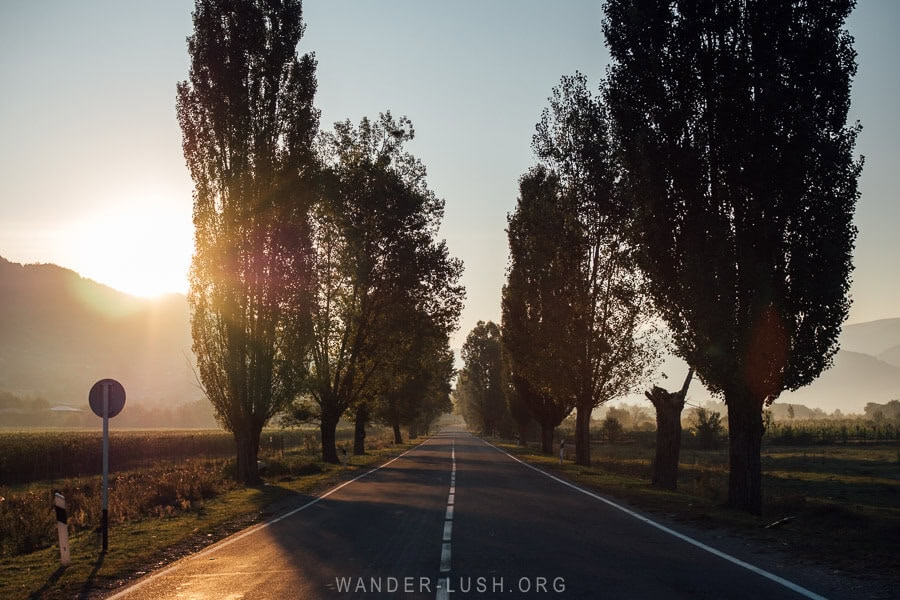
What are the roads like in Georgia?
It is a well-known fact that infrastructure is still developing in Georgia. Huge strides have been made since I first visited in 2017, especially with regards to the roads.
Overall, the roads in Georgia are of a pretty high standard. Much better than you might expect. Through a combination of self-driving, travelling in vans and being driven around on tours, I have travelled almost every highway and many backstreets, and I’ve only encountered a handful of bad stretches.
99% of the roads you will use as a tourist driving around Georgia are sealed. Not only are they sealed, but they are mostly smooth and pothole-free. Two things to keep in mind are that the roads are often narrow (even some major roads are only single-track), and line markings are sometimes faded or missing altogether.
Village and rural roads are more likely to be unpaved – either compacted rubble or loose rock. Some cities (notably Poti) have worse roads than others.
The roads to popular attractions such as David Gareja Cave Monastery, Vardzia and Katskhi Column are all sealed and manageable in a sedan. The road to Gergeti Trinity Church from Kazbegi is also paved and easy to drive in the warmer months (but I recommend you avoid it in winter).
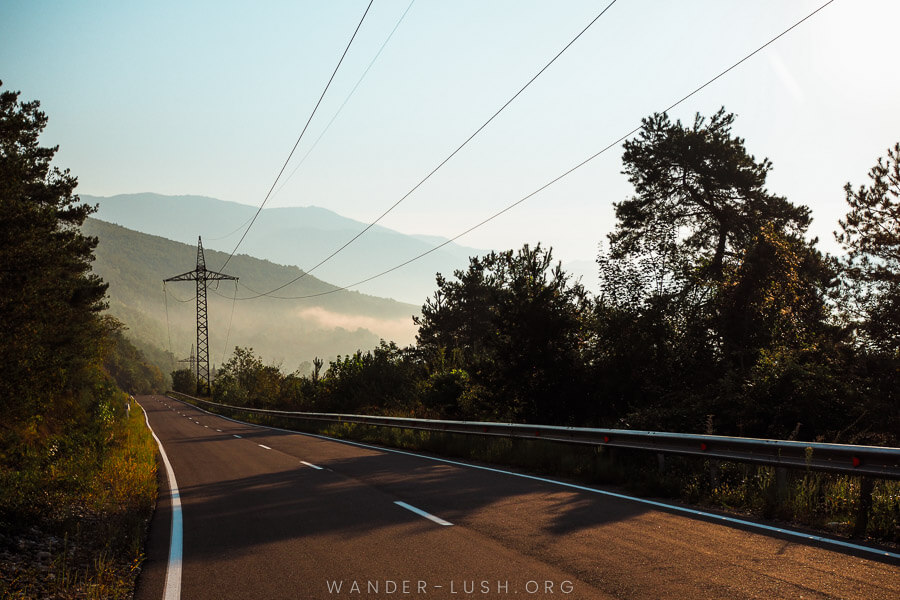
Scenic roads
Here are just a few of my favourite drives for breathtaking scenery. All of these roads are newly sealed and suitable for a sedan.
- The Koda-Ninotsminda Road – My favourite drive in Georgia, this road runs across the Javakheti Plateau with stunning volcanic landscapes and lakes along the way. You can use this road to get from Tbilisi to Vardzia.
- Sachkhere to Oni – The new pass connecting Imereti and Racha is terrific for mountain scenery. You can use this road to travel from Kutaisi or Chiatura to Racha.
- The Kutaisi-Ambrolauri Road – Connecting Kutaisi with Racha, this road travels over the Nakerala Pass via Shaori Lake. Like the Sachkhere-Oni Road, it is particularly pretty in autumn.
- The Alpana-Tsageri Road – A loop road through Lechkhumi Region fringed by vineyards and limestone rock formations.
- The Tianeti-Ninigori Road – A handy way to travel from Kakheti Wine Region to Kazbegi without having to go through Tbilisi, this road is newly sealed and has a few points of interest along the way, including Kvetera Fortress Church.
- The Didgori Valley Road – The road to the Battle Memorial is like a ribbon draped over undulating hills. It is incredibly beautiful and almost always quiet.
- Tetritskaro to Bolnisi – This new road passes through Samshvilde Canyon and a beautiful pocket of Kvemo Kartli Region.
- The Gombori Pass – Though not new, the road from Tbilisi to Telavi was recently upgraded. It is a bit windy, but it passes through a gorgeous forest. Stop for Ujarma Fortress.
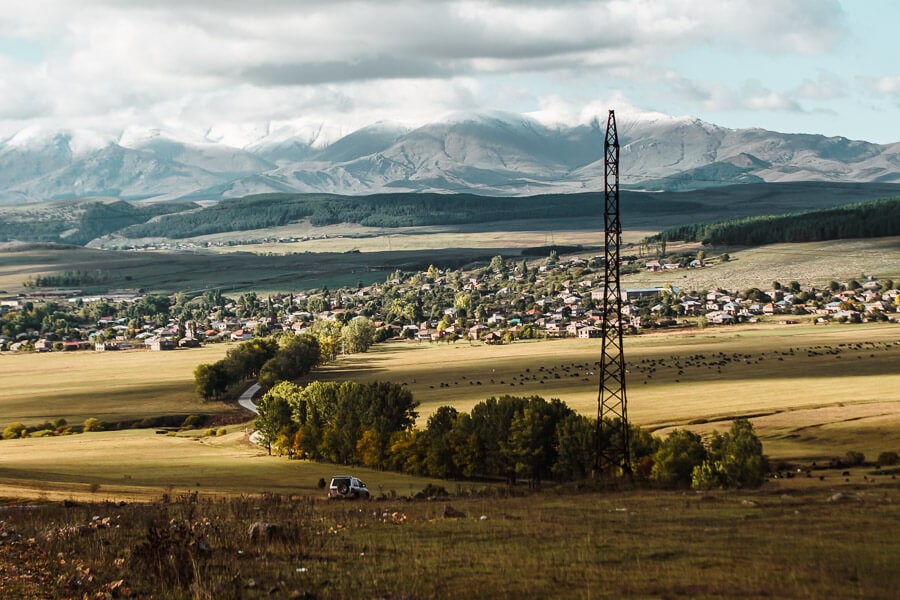
Problematic roads
There are a few stretches of road that you should approach with caution. These include:
Some rental companies in Georgia prohibit you from driving on some or all of these roads, so be sure to read the fine-print when planning your route.
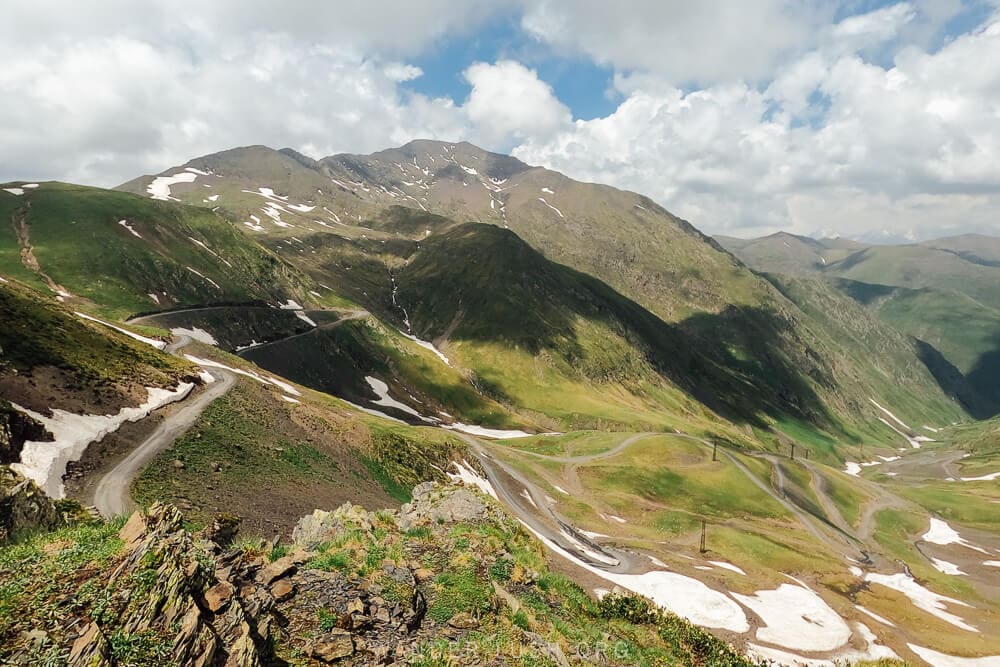
The road to Tusheti (the Abano Pass) and the road to Khevsureti are both challenging mountain roads that I do not recommend you tackle yourself. These journeys are much better done with a Georgian driver who is familiar with the conditions.
It is possible to self-drive from Zugdidi to Mestia (Svaneti), but again, you should approach this road with caution – especially in late autumn and spring. I do not recommend driving this road in winter.
Some people might even find Tbilisi to Kazbegi via the Georgian Military Highway too stressful. This road always has heavy traffic due to the large number of trucks crossing the border. You might find that it is better done with an experienced driver booked through GoTrip.
Since Georgia has a zero-tolerance policy to drink driving, Kakheti wine region does not lend itself particularly well to a road trip, either. For visiting vineyards and doing wine tastings, I recommend booking a dedicated wine tour from Tbilisi.
Finally, I do not recommend driving in Tbilisi city! The traffic is terrible, and some roads are very narrow. Use the city’s public transport system instead.
Seasonal road closures
Some mountain roads in Georgia are closed during winter and only passable during the warmest months of the year, from late May until October (depending on weather conditions and snowfall). While many roads are cleaned during winter, the high mountain passes are not.
The road from Tbilisi to Kazbegi, for example, often closes for short period during the winter months. The road to Gergeti Trinity Church from Kazbegi is difficult to navigate in winter, thus it’s best to hire a Delica taxi if there is snow or ice.
Floods and landslides are not uncommon in spring and early summer. Shortly before my first road trip, the road in Upper Racha completely washed away, leaving villages cut off for a week until a temporary road was constructed (I actually drove the new road).
An up-to-date list of road closures and restrictions can be found here on the GeoRoad website (in English).
It is always a good idea to check road conditions and closures before you set out. Call the Roads Department Hotline on +995 322 313 076 and follow them on Facebook for regular updates.
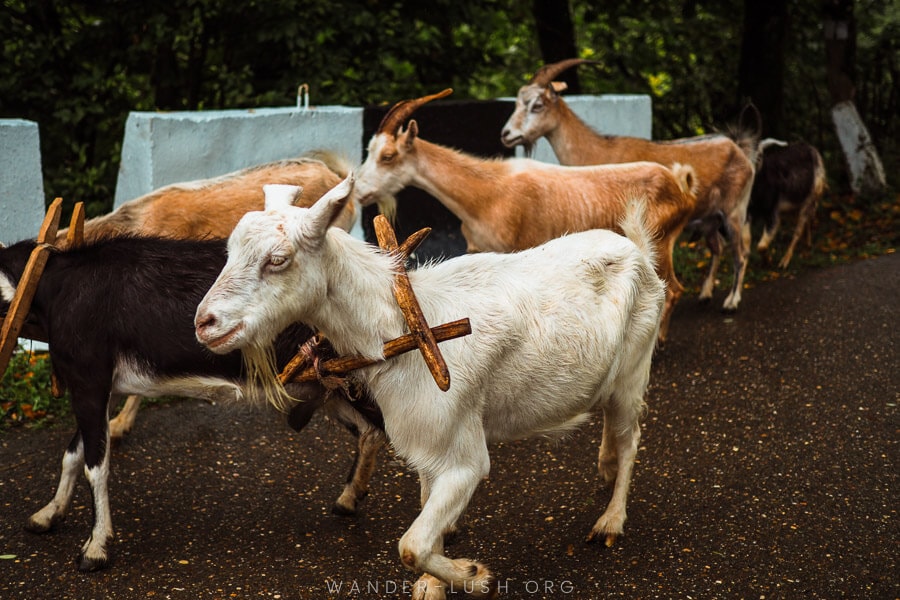
The new Rikoti Highway
For the past few years, a new east-west highway has been under construction in Georgia. Once complete, it will cut the cross-country journey time in half by allowing drivers to bypass Kutaisi, Zestafoni, and other areas. Travel time from Tbilisi to Batumi will be 3.5 hours.
The new Rikoti Highway includes 97 new bridges and 51 new tunnels. As of spring 2024, around 70% are open to traffic. Google Maps hasn’t quite caught up yet, so the estimated travel times you see on the app/website are a bit off.
While certain stretches of road are now much faster, roadworks are ongoing. It’s important to remember that there might still be delays when travelling on the highway.
There are alternative ways to travel across Georgia that avoid this new highway. My Georgia Road Trip Itinerary routes you along a scenic road instead.
Map of roads in Georgia
Here is a quick map I created of notable roads in Georgia, including popular unpaved, gravel and sealed roads that you might encounter on your travels.
I try to keep this map updated. Click through to open the latest version in Google Maps.
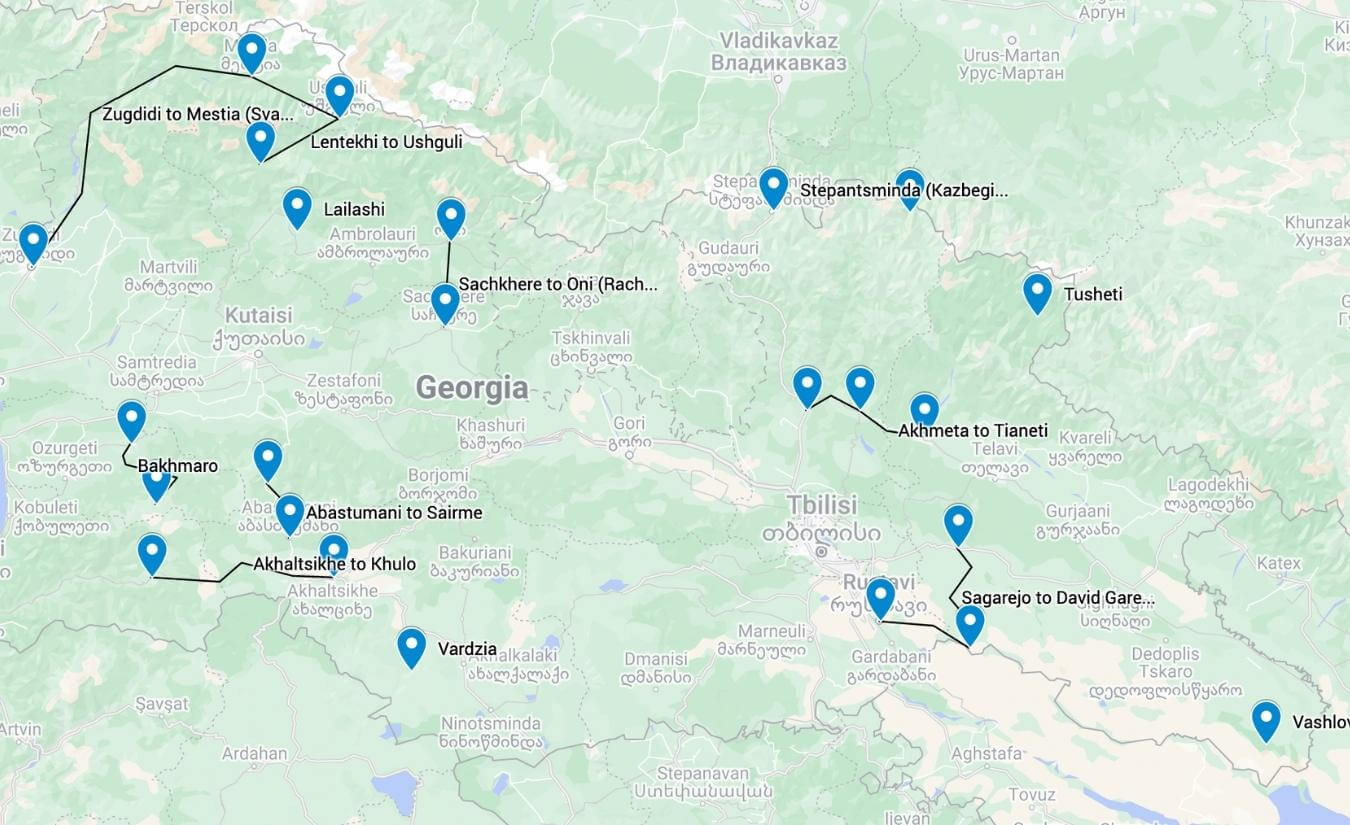
Driving style & road safety in Georgia
The roads in Georgia might be better than you were expecting – but the driving style is crazier than you could ever imagine!
People often tell me the roads in Georgia are the worst they have experienced. But having lived in Cambodia and Vietnam, I really don’t think it’s that bad.
The biggest issue is the driving style. Georgian drivers tend to be impatient and somewhat aggressive. This is of course a generalisation, but it’s based on my personal experience (and I think you will find that most people would agree with me).
I could advise you to brush up on Georgian road rules before you get behind the wheel, but there is really no point. No one seems to follow the rules, despite there being a heavy traffic police presence.
My best advice is to take your time, be hyper aware of other cars, stay out of other people’s way as much as you can, and try to avoid making any sudden moves.
Set out early in the morning (before 10am) when there are fewer people on the roads, and never drive at night. Avoid driving in the big cities (Tbilisi, Batumi) at all costs, and try to stick to quieter backroads.
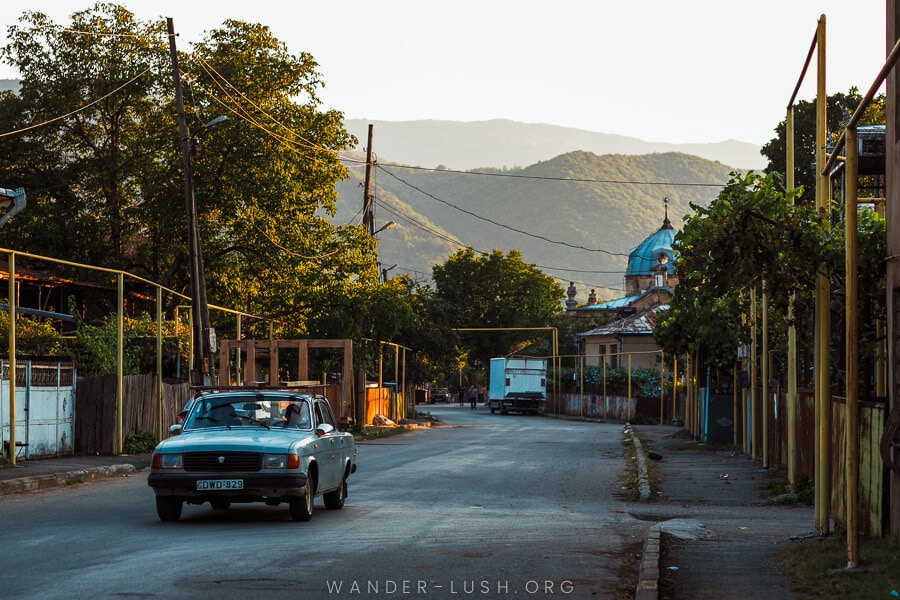
Key quirks to be mindful of
Here are a few lessons I have learned the hard way:
- People love overtaking at high speed, especially on single-lane roads. This includes crossing solid lines (technically illegal). In some cases, a car will come up the middle or appear on your right side, creating a third traffic lane where there isn’t supposed to be one. In addition, cars constantly drift from lane to lane without indicating. This is just something you just have to get used to. Check your mirrors constantly and be aware of people overtaking you from every angle.
- It is not uncommon to see a car hurtling towards you at high speed. I will never get used to this. When you see a car overtaking its lane and coming towards you, slow down and move as far to the right as you can so they have enough room to reintegrate with their lane or squeeze down the middle.
- Right of way (including on roundabouts) goes to the most expensive or biggest vehicle. Technically you should give way to traffic on the right, but in practice there is no rhyme or reason to roundabouts – just take it slow and hope for the best.
- No one shoulder checks. Be very wary of merging traffic and slip lanes, and even of cars pulling onto the road from driveways or the curb.
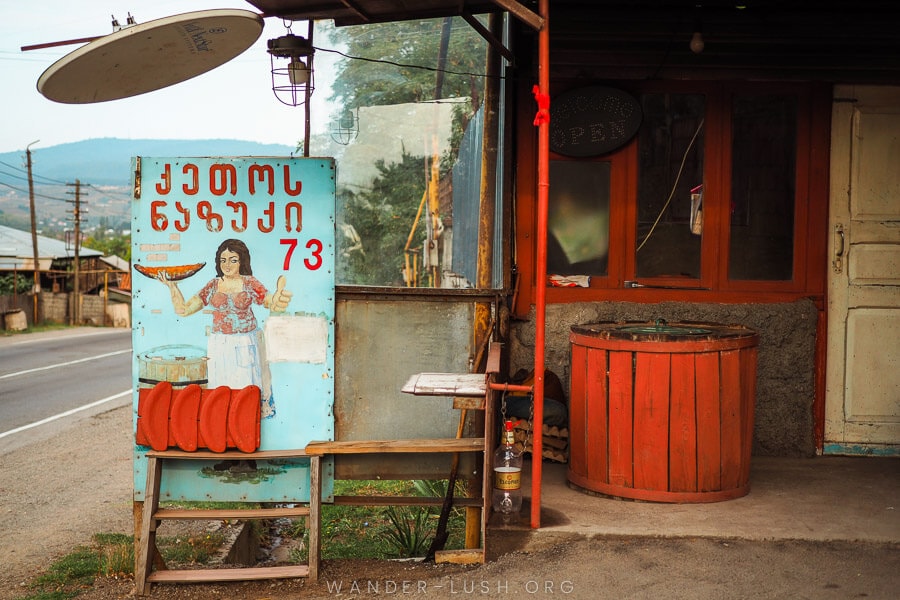
- Forget the rule of seconds. Cars drive bumper to bumper. If you leave a gap in front, someone will overtake you from behind and fill it immediately. Do the best you can to keep a safe distance.
- Drivers will do anything to not have to stop. I think slowing down is seen as a sign of weakness. This means that drivers always dodge parked cars and other obstructions at high speed. If you do stop suddenly, there’s a high chance the car/s behind you – which will invariably be hugging your rear bumper – will collide. Yes, this happened to me once!
- Be hyper alert to animals on the road. See livestock on the road is very common in rural areas. Cows especially can be very stubborn and reluctant to budge – inch up to them very carefully and use your horn if you need to.
- When in doubt, use your hazard lights. Hazard lights are used to alert other cars to an obstruction on the road (such as cattle). Make sure you always have your finger ready to hit the hazard lights. When I drive, my husband is in charge of controlling the hazard lights.
- Don’t honk. Aside from persuading cows to move, it is not at all common to use your horn in Georgia. If you need to get someone’s attention, flash your lights instead.
Georgia car hire FAQ & troubleshooting
Do you need a GPS for Georgia?
No, you don’t need a GPS unit for Georgia.
Google Maps is more than sufficient for navigating. Just note that some new roads might be unmapped, and sometimes locations on the map don’t match up with reality.
When planning your trip, I recommend you add on about 30% extra to the time estimate that Google Maps gives you.
To make navigation easier and to ensure you can reach your agent in case of an emergency, I highly recommend you buy a local SIM card or eSIM when you arrive in Georgia. Magti has the best coverage and is my top choice.
How do gas stations work in Georgia?
Gas (petrol) stations in Georgia work the old-school way: Pull in, and the attendant will fill up the tank for you. No need to get out of the car.
All you need to do is tell them is the type of fuel you desire, and the value in GEL that you’re after.
There are several types of fuel available in Georgia. When you pick your car up, be sure to ask the agent what fuel is best. Nine times out of 10 you will need to fill up with Premium 95 octane or higher. Just say ‘Premium’ to the attendant – they will understand.
Payment can be made in cash or by card. Even small gas stations normally have a portable terminal.
Gas stations are ubiquitous around the country, even in small villages. If you are driving into the mountains or towards a very rural area, it’s a good idea to fill up the tank before you set out.
Wissol, Gulf and Socar are three big gas station brands that are always reliable.
Most gas stations have other amenities too, including free restrooms and a shop where you can buy snacks and cold drinks. Unlike in some other countries, you cannot pump up your tires at a gas station – for that, you will need a garage that does vulcanisation.
The price of gas in Georgia hovers at around 3.30 GEL (1.20 USD) per litre. Check current petrol prices on this website.
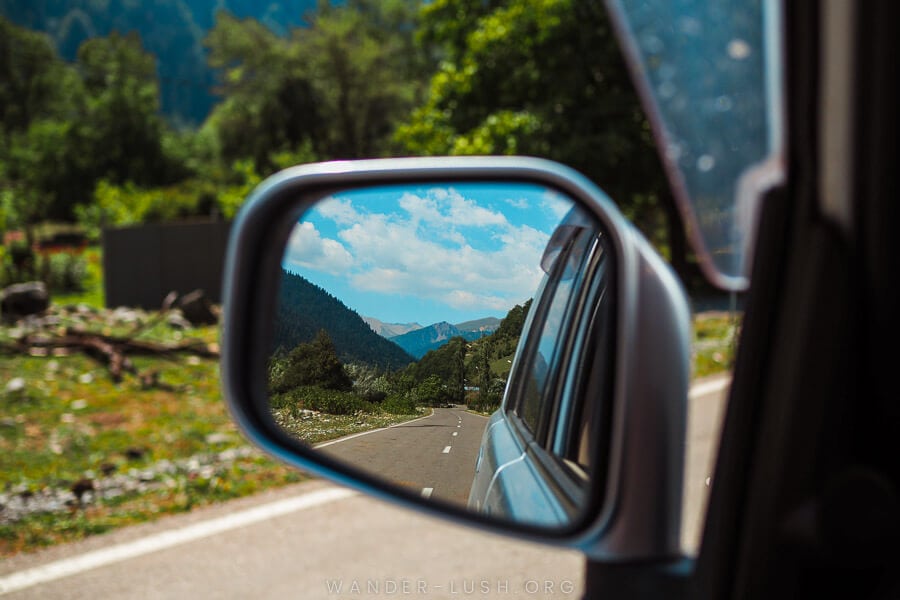
What if I get a flat tire?
If you get a flat tire or have car trouble on the road, the first thing you should do is call your rental agent. They will be able to advise you on the best steps to take.
Garages are pretty ubiquitous and can normally be found around major junctions or on the outskirts of town near the entrance to the highway. In more remote areas, workshops might be closed on Sundays.
As I alluded to earlier, I have a lot of experience with flat tires in Georgia. Neither Ross or I are particularly handy with cars, so we have always had to rely on a helpful guesthouse host (or friendly stranger) to help us out.
On one occasion in Kakheti, we were helped by a friendly neighbour in Telavi who we took our Prius to a local garage and had the tire mended and re-fitted. This cost us a grand total of 20 GEL. It was a Sunday and he opened the garage especially for us.
After sustaining flats in Sachkhere and Akhaltsikhe, we later learned that the going rate for a patch-up is 10 GEL.
What if I damage my car or get into an accident?
If you get into any difficulty or damage your car in any way, call the agent immediately. Insurance normally requires you to report any incident to the police immediately – so don’t wait until you return the car.
If you are involved in an accident, stop the car immediately. Moving the car even one centimetre might void the insurance. Call the police and your agent immediately.
What if I get a speeding fine?
You wouldn’t think it from the way people drive, but speed cameras are very common in Georgia. The fine for speeding ranges from 50-100 GEL.
These ‘smart cameras’ can also pick-up other violations, including not stopping at a stop sign (50 GEL fine), driving without a seatbelt (40 GEL fine), and using a mobile phone whilst driving (30 GEL fine).
If you get caught crossing a solid white line, you will be fined 200 GEL.
Fines are drawn up immediately and issued to the owner of the car via SMS, usually within 4 hours. You then have 30 days to settle the fine or 10 days to appeal it.
If your agent notifies you about a fine, I highly recommend double-checking it before you pay. All violations are recorded on the Administrative Penalties website – search (in English) using the car’s technical passport number and licence plate number.
If you get issued a ticket by a police officer in person, you absolutely cannot pay on the spot. Given Georgia’s stance on anti-corruption, flashing cash in this situation could get you into trouble (or at least lead to a very awkward situation). It happened to me once.
Instead, fines should be settled using a paybox machine. Input the protocol number on the ticket then pay with cash or card. If you have any difficulties, visit a Bank of Georgia or TBC branch. Staff there will be able to assist you.
If you have a local bank account, you can search and settle fines via your mobile banking app.
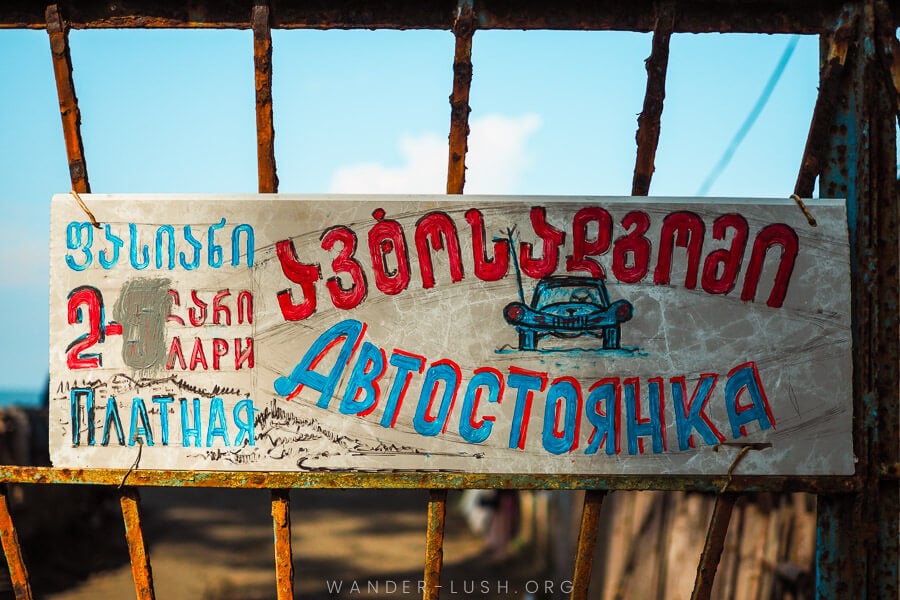
Is it easy to find a car park in Georgia?
Parking in Tbilisi is difficult – just one more reason to avoid driving in the capital.
Tbilisi, Kutaisi and Batumi all have their own parking payment systems. Passes can be purchased online:
Outside of these three cities, free parking is plentiful.
Oftentimes parking lots and free parking bays are managed by an attendant dressed in a brightly coloured vest. They are there to help you in and out of the spot, and to watch over your car. It is polite (and frankly, expected) to give a small tip as you leave. A few coins will suffice.
What is a Georgian car passport, and do I need one?
Every car in Georgia must carry a ‘technical passport’, a small ID card that proves the vehicle is registered. Before you take off, it is important to double-check that your car has one, and that you know where to find it in case you get pulled over by the police.
It is usually kept in the glovebox or in the pop-down sunglasses compartment above the centre console.
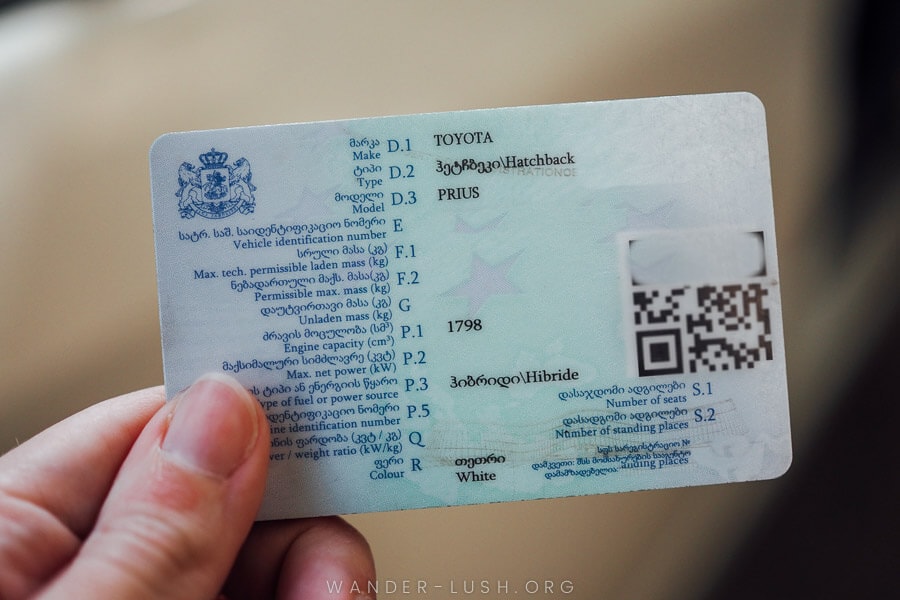
Can I drive from Georgia into a neighbouring country?
If you are travelling through the Caucasus, it is often easier (and more affordable) to rent separate cars in each country. Local Rent also operates in Armenia and in Azerbaijan.
It is possible to drive into Armenia from Georgia. I did this recently with my dad.
I recommend using the border crossing at Ninotsminda-Bavra rather than the more popular Sadakhlo-Bagratashen. The former is much quieter and faster (but do note that the road on the Armenian side is in pretty bad shape). Insurance for Armenia can easily be obtained from one of the offices at the border.
Under normal circumstances, you can drive from Georgia into Azerbaijan. However, with the country’s land borders still closed to inbound travellers, this option is off the table for now.
It is not possible to drive a Georgian rental car into Turkey or Russia.
If you want to cross the land border in a rental, you will need to obtain a notarised power of attorney from the vehicle’s owner. This incurs an extra fee (around 150 GEL) and takes a minimum of 2 weeks to prepare.
Not every agent will let you take their car across the border. Local Rent does not have this option, but Martyna z Gruzji does.
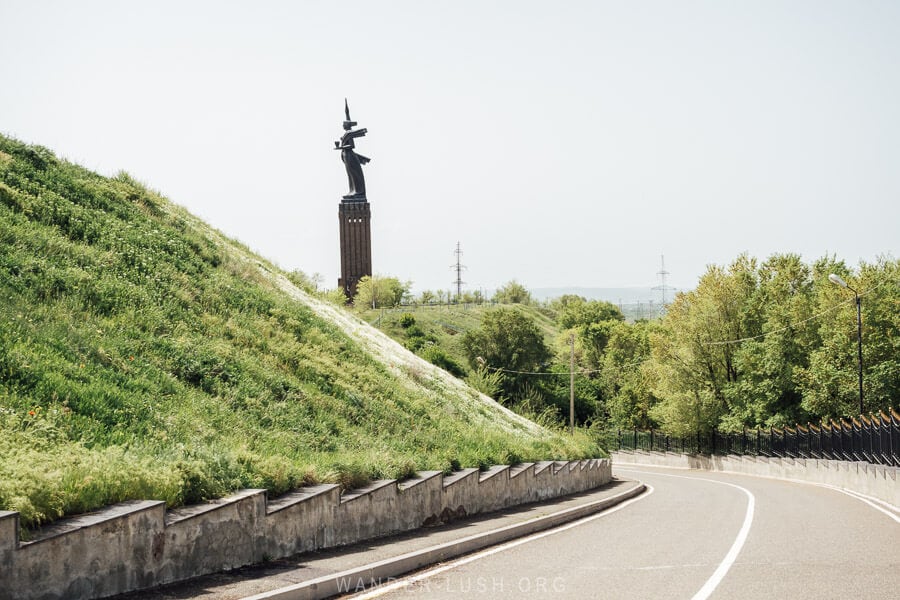
My experience hiring a car in Tbilisi through a local agent
I have rented cars in Georgia a dozen or more times now. Aside from those flat tires, things have always gone smoothly!
This section refers to my first car rental experience using Local Rent.
Reservation: I booked my car a few weeks in advance using the Local Rent website. The only additional fee I paid was for a one-way rental – the car I chose came with all insurance included. Once my reservation was confirmed, I received confirmation by email.
A few days before I was set to pick up my car, I decided to change my itinerary slightly and wanted to nominate a different pickup address closer to the highway. I emailed Local Rent and they did this for me straight away and sent me a new confirmation.
Pick up: The day prior, I received an email from the agent supplying my car asking for a photo of my passport and driver’s license so that he could prepare my contract. The night before, I received a text message to confirm the pickup address. They also asked if I had the correct amount of cash on hand or if I’d need change.
On the day of the handover, a representative from the agency met me on a street corner with the parked car. I did a quick inspection of the vehicle, then he presented me with a contract in English that I signed. This included a diagram of the car with all scratches and dings marked out. I paid him in cash and we parted ways.
My car, a 2003 Pajero, was definitely worn in, but it served me well. The interior of the car wasn’t very clean, but I didn’t mind. The tank was full.

Drop off: Towards the end of my road trip, I had to change my itinerary again and re-route. I emailed Local Rent and they advised me to contact the agent directly. I was able to organise a new drop off address (in a different city, mind you) without any hassle. All I had to do was confirm the final address the night before.
On the morning I was set to drop off the car, I sent an email with my ETA of 12 midday. The agent asked me to hold onto the car for a few more hours to give his driver time to reach me from Tbilisi. Brilliant!
When we eventually had our rendezvous, the driver did a cursory inspection of the outside of the car and checked that the tank was full. He gave me a big thumbs up, and that was it. Too easy.
The process of going through a local agent was a lot more relaxed than what I’m used to. But everything went smoothly, and I really appreciated the flexibility of being able to adjust my pickup and drop off locations at the last minute.
Conclusion: My best tips for driving in Georgia
Here are the most important things to remember:
- Use a local agent, but go through an aggregator site such as Local Rent. This will give you the best of both worlds in terms of value, flexibility and security.
- A sedan will do for most roads, but a 4WD (or at least a robust car with high clearance) is never a bad idea.
- Take whatever insurance is available. Many cars on Local Rent come with comprehensive insurance included for no additional fee.
- Organise to pick up and drop off your car up on the outskirts of the city. Driving through Tbilisi or Batumi is never pleasant.
- At pickup, be sure to inspect the car thoroughly for damage and take lots of photos or a video. Check the lights are working and note down the fuel level. Often cars come with a low tank, so you might need to visit a petrol station first up.
- Always re-confirm your pick-up and drop-off times. When you use Local Rent, the process for returning the car is very different! Many agents don’t hold you to the return time like international outfits do. Be sure to contact the agent a few hours beforehand to make sure they are there to meet you – otherwise you might get stuck waiting for them.
- Google Maps works perfectly in Georgia for navigation. There is no need to hire a GPS unit. Buy a Magti SIM or eSIM before you set off.
- Familiarise yourself with road conditions and use the Geo Roads page/hotline to check on any closures. If you are driving into the mountains, it is essential to check weather conditions before you set off.
- Hit the road bright and early. Georgia is late to rise generally, so you can have the roads almost to yourself if you get an early start.
- Avoid driving at night.
- If you get into any difficulty or damage your car in any way, call the agent immediately. Insurance normally requires you to report any incident to the police at the time – you can’t wait until you return the car.
- If you are involved in an accident, stop the car immediately. Moving the car even one centimetre might void the insurance. Call your agent and the police immediately.
- Go slow. If in doubt, stick to the right and other drivers will leave you be!
So, would you drive in Georgia? Anything else you’d like to know about renting a car in Tbilisi or driving in Georgia? Let me know in the comments below and I’ll do my best to help.
You might also be interested in…
